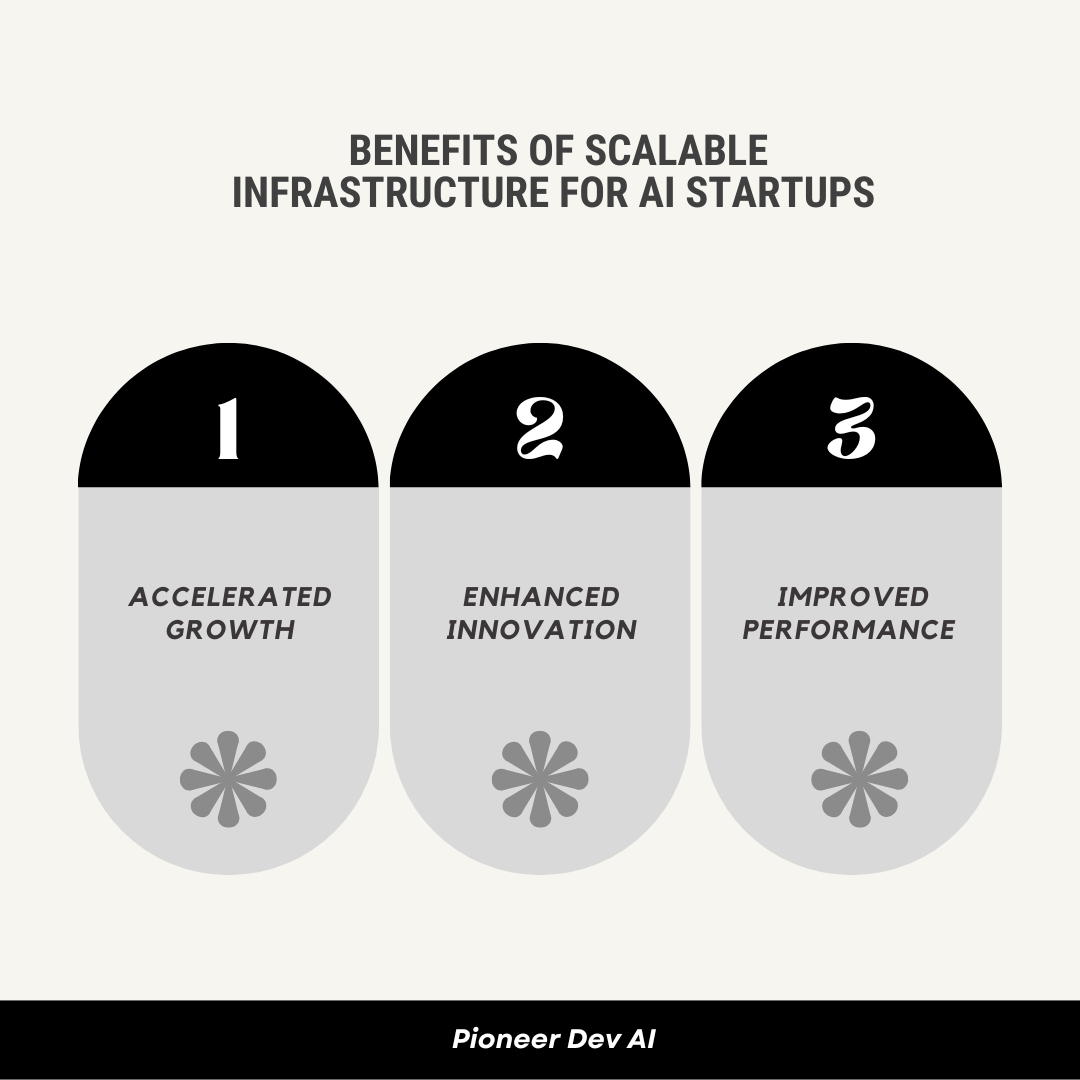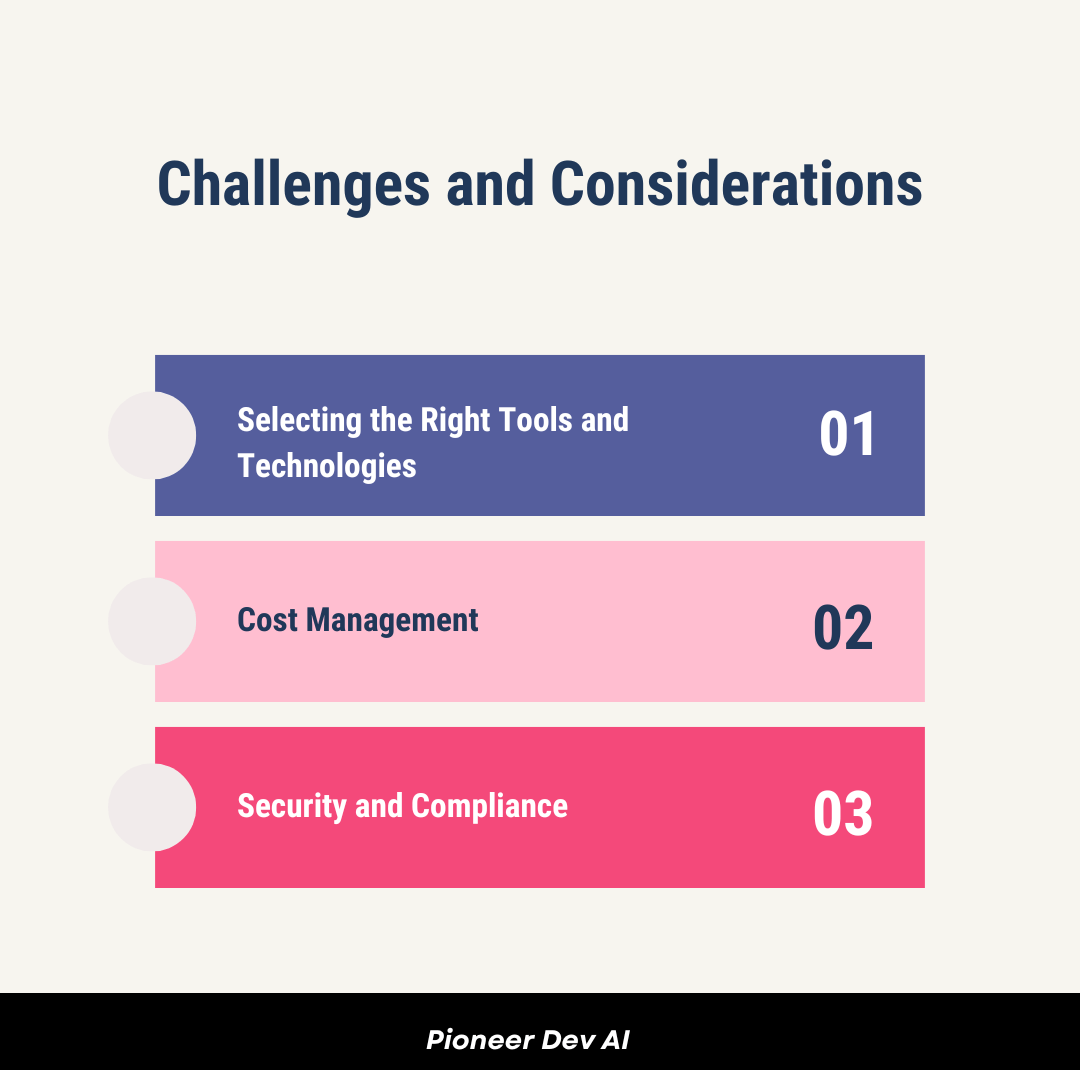Scalable Infrastructure for AI Startups: Key to Growth and Innovation
The rapid changes in technology have created unprecedented opportunities for AI startups to innovate and thrive. As these companies seek to leverage advanced algorithms and machine learning models, the need for effective and scalable infrastructure becomes increasingly critical.
A robust infrastructure not only supports the complex data processing requirements inherent in AI applications but also allows startups to adapt to changing market demands and scale operations efficiently.
In this article, we will explore how scalable infrastructure catalyzes growth and innovation in AI startups, enabling them to harness the full potential of artificial intelligence while ensuring they remain agile and competitive in a fast-paced environment. By understanding the importance of a strong foundation, founders and decision-makers can make informed choices that foster long-term success.
Understanding Scalable Infrastructure
Scalable infrastructure refers to the ability of a system to handle increasing workloads by adding resources, whether it’s computing power, storage, or network capabilities, without compromising performance.
For AI startups, this means creating a foundation that can grow alongside their projects, accommodating more users, processing larger datasets, and supporting more complex algorithms as their needs evolve.
Key components of scalable infrastructure include cloud computing, storage solutions, and networking capabilities.
For instance, cloud computing platforms like Amazon Web Services (AWS) or Microsoft Azure allow startups to leverage on-demand resources, scaling up during high-demand periods and scaling down during quieter times. This flexibility is crucial; a study by Gartner predicts that by 2025, 80% of all enterprises will migrate to the cloud , emphasizing its importance for modern startup ideas.
Additionally, effective storage solutions, such as scalable databases, enable startups to manage vast amounts of data generated by AI applications without latency issues.
Networking infrastructure, including content delivery networks (CDNs), ensures quick and reliable access to applications for users worldwide. Together, these components form a robust AI infrastructure that supports the unique needs of startups, positioning them for success in an increasingly competitive market.
Benefits of Scalable Infrastructure for AI Startups
Accelerated Growth
One of the most significant advantages of scalable infrastructure for AI startups is its ability to facilitate accelerated growth. With a scalable system in place, startups can quickly adapt to fluctuating market demands, ensuring they can seize opportunities without the limitations of their infrastructure holding them back.
For instance, companies like Zoom scaled rapidly during the pandemic, leveraging cloud-based services to accommodate millions of new users almost overnight. This flexibility enables startups to launch new features or products in response to consumer demand swiftly, reinforcing the idea that effective ai infrastructure is a cornerstone of sustainable growth.
Enhanced Innovation
Scalable infrastructure also plays a crucial role in fostering enhanced innovation within AI startups. With the ability to scale resources as needed, teams can freely experiment and iterate on AI models without facing the constraints of limited infrastructure.
For example, Google’s TensorFlow provides developers with a scalable framework for building and training machine learning models, allowing them to test various approaches without worrying about resource availability. This freedom encourages a culture of experimentation, where startup ideas can be developed and refined rapidly, ultimately leading to more innovative solutions and products.
Improved Performance
Another essential benefit of scalable infrastructure is the significant improvement in application performance. As infrastructure scales, applications can maintain or even increase their speed and responsiveness.
A study by Amazon Web Services found that a mere 100-millisecond increase in latency can lead to a 1% decrease in sales , emphasizing the importance of performance in user satisfaction and retention

Key Features of Effective Scalable Infrastructure
Cloud Services
Cloud services are a fundamental aspect of effective scalable infrastructure for AI startups. Platforms like Amazon Web Services (AWS), Google Cloud, and Microsoft Azure provide flexible and scalable resources that enable startups to easily adjust their computing power and storage needs based on demand.
Automation Tools
Automation tools play a crucial role in efficiently managing and scaling infrastructure for AI startups. By automating routine tasks such as provisioning, monitoring, and updating resources, startups can reduce operational overhead and improve response times.
Tools like Kubernetes for container orchestration and Terraform for infrastructure as code enable startups to automate deployment processes and scale applications seamlessly.
Data Management Solutions
Robust data management solutions are vital for AI startups as they ensure effective storage, processing, and analysis of data. With the increasing volume of data generated by AI applications, having a scalable and efficient data management system is paramount.
Challenges and Considerations
Selecting the Right Tools and Technologies
One of the significant challenges startups encounter is selecting the right tools and technologies for building scalable infrastructure. With many options available, each offering various features and capabilities, it can be overwhelming for new companies to determine which solutions best align with their needs and goals.
Additionally, the rapid pace of technological advancements means that what is considered state-of-the-art today might quickly become outdated. Startups must thoroughly evaluate their current and future requirements, balancing flexibility, performance, and compatibility.
Cost Management
Cost management is another critical consideration as startups scale their infrastructure. While scalable solutions often offer the promise of paying for only what is used, hidden costs can quickly accumulate.
These may include expenses related to data transfer, additional storage, or advanced features that were initially overlooked. A lack of careful budgeting and forecasting can lead to budget overruns, straining the financial resources of startups already operating on tight margins.
Security and Compliance
As startups expand their infrastructure, maintaining data security and compliance becomes increasingly vital. Scaling operations can inadvertently expose vulnerabilities if security measures are not appropriately updated to match the growing complexity of the infrastructure. Startups must stay informed about industry regulations and compliance requirements, ensuring that their infrastructure adheres to standards such as GDPR, HIPAA, or PCI DSS.
Failing to prioritize security can lead to data breaches, legal repercussions, and damage to the startup’s reputation. Developing a robust security framework from the outset and regularly reviewing compliance protocols is essential for safeguarding sensitive data and building trust with customers and stakeholders.

Getting Started with Scalable Infrastructure
Assessment of Current Infrastructure
The first step for startups in establishing scalable infrastructure is to assess their current setup. This evaluation should include a thorough analysis of existing hardware, software, and network capabilities to identify any limitations that may hinder scalability.
Startups should consider questions such as: Are current resources sufficient to handle increased demand? Is the existing architecture flexible enough to integrate new technologies?
By conducting a comprehensive audit, startups can pinpoint areas that require enhancement or replacement to accommodate future growth. This foundational understanding not only aids in crafting effective startup ideas but also sets the stage for a robust ai infrastructure that supports long-term innovation and expansion.
Planning for Scalability
Once the current infrastructure has been assessed, the next step is planning for scalability. Startups should design their infrastructure with growth in mind, prioritizing modularity and flexibility.
By focusing on scalable design principles, such as microservices architecture and containerization, startups can ensure their ai infrastructure remains efficient and responsive as they evolve.
Resources and Tools
To facilitate the implementation of scalable infrastructure, startups can leverage various resources and tools tailored to their needs. Cloud platforms such as Amazon Web Services (AWS), Google Cloud Platform, and Microsoft Azure provide comprehensive services for scaling operations.
Automation tools like Terraform and Ansible streamline deployment and management processes, while data management solutions such as Snowflake and MongoDB enhance data handling capabilities.
Conclusion
By understanding and implementing effective infrastructure, startups can better assess their current capabilities, plan for future growth, and leverage essential tools and resources. This strategic approach enables them to not only adapt swiftly to market demands but also foster innovation and enhance performance.
As you embark on your journey to create a robust infrastructure, consider the many tools and solutions available to help you achieve your goals. At Pioneer Dev AI , we specialize in providing tailored AI infrastructure solutions that empower startups to scale efficiently and effectively.
Whether you’re just starting or looking to enhance your existing systems, our expertise can guide you in building a sustainable foundation for your innovative ideas. Explore how our services can help you unlock your startup’s full potential today!

